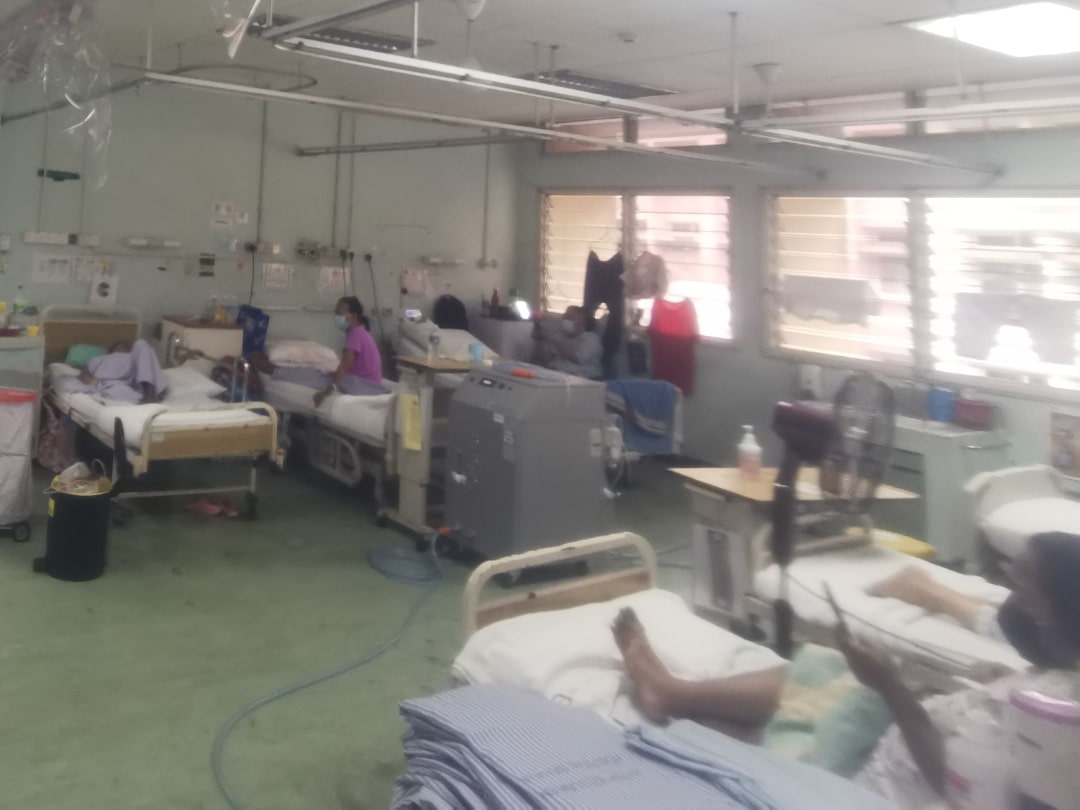KUALA LUMPUR, Oct 5 — Sibu Hospital’s top management today explained efforts to increase bed capacity, after a tweet alleged overcrowding of Covid-19 patients under intensive care.
Sibu Hospital director Dr Nanthakumar Thirunavukkarasu, in a statement today, said that the hospital has 17 gazetted beds, with the majority of staff and existing medical equipment being transferred from non-Covid intensive care units (ICUs) to Covid ICU wards.
Sibu Hospital has also increased its ICU bed capacity to 57 beds (28 beds in ICU and 29 beds repurposed to the acute Covid-19 ward) to cope with the higher number of coronavirus patients being admitted to the hospital, he said.
A person tweeted on October 1, but subsequently deleted the tweet, that Sibu Hospital has a maximum of 28 Covid-19 ICU beds that are all full, not 57 as claimed by the Sarawak state health department, saying: “Sibu is at its worst now. We are seeing the worst wave.”
Dr Nanthakumar said additionally, there are 13 ICU beds in the respiratory ward that are still being upgraded, which will add to the number of ICU beds available by October 30. Another 10 beds from modular ICUs are being built and will be ready by October 11.
Two wards, namely the respiratory ward and Ward 17, at Sibu Hospital are in the process of being upgraded. Once completed, both wards can accommodate another 75 beds in total.
“This will indirectly increase the capacity of Sibu Hospital to accommodate the current lack of bed capacity,” said Dr Nanthakumar.
The acute Covid-19 ward, which has a capacity of 64 beds, currently accommodates 124 patients. To overcome this problem, a section of Ward 17 will be opened from tomorrow as an extension of the acute Covid-19 ward with 24 beds.
The hospital management is also in the process of establishing a field hospital to overcome the problem of insufficient beds, in particular, for non-Covid cases, Dr Nanthakumar said.
The field hospital is expected to be able to accommodate 100 beds. All construction costs will be borne by the Sarawak state disaster management committee (SDMC). The operation will be handled by health personnel from the Malaysian Armed Forces as well as a combination of existing hospital personnel. However, the matter is still in the process of awaiting approval.
Meanwhile, on the hospital’s delayed elective surgeries, Dr Nanthakumar said Sibu Hospital has attempted to outsource patients to private hospitals around the Sibu district. An additional allocation worth RM600,000 was received on September 27 for this purpose.
Covid-19 patients who are stable will be placed at the Daro Hospital and Kanowit Hospital to ease congestion in Sibu Hospital. The Daro Covid-19 low-risk quarantine and treatment centre (PKRC) was also established to help ease the situation.
On the issue of insufficient manpower due to infected hospital staff, Dr Nanthakumar said an internal report showed that a total of 53 staff were infected.
Dr Nanthakumar said many efforts to break the infection chain have been implemented to ensure that services in all wards are not disrupted.
The hospital’s team of nurses has also started a 12-hour shift service. Although staff leave was frozen in the interest of the service, flexibility will be given if there are emergency cases involving family members such as medical matters and deaths.
The hospital management has requested that contract nurses be retained to work at Sibu Hospital until December 31 in the interest of the service, despite having obtained a permanent position in another hospital.
The anaesthesiology department of Sibu Hospital so far has 12 specialist medical officers but two are quarantined and one is on maternity leave, 36 medical officers (two quarantined, two on sick leave), as well as 93 nurses (seven quarantined).
All of them have been tasked to perform treatment in ICUs involving Covid-19 patients covering a total of 28 beds and nine non-Covid beds, two Covid-19 operation theatres, two non-Covid operation theatres, as well as clinic anesthesiology and acute pain services.
“The management of Sibu Hospital is doing its best to ensure staff mobilisation efforts involving 35 medical officers, 40 nurses, 25 assistant medical officers and 20 health care assistants are optimised so that all Covid-19 and non-Covid operations and services can run smoothly.
“Sibu Hospital will receive another 10 medical officers and 10 assistant medical officers from the peninsula to assist in our Covid-19 operations,” Dr Nanthakumar said.








